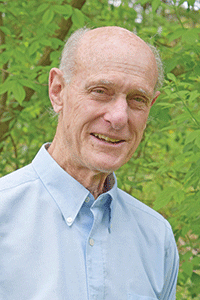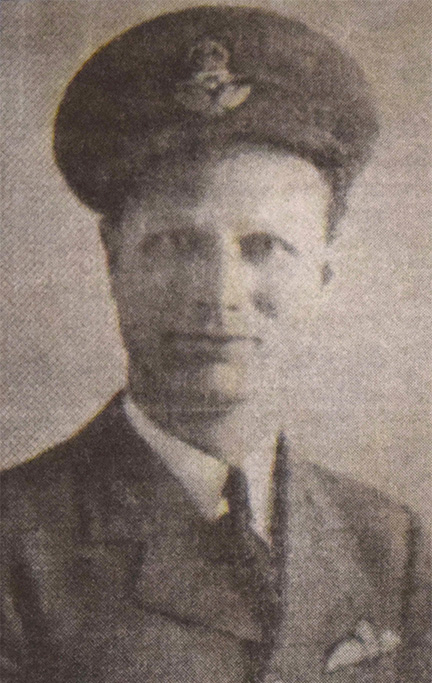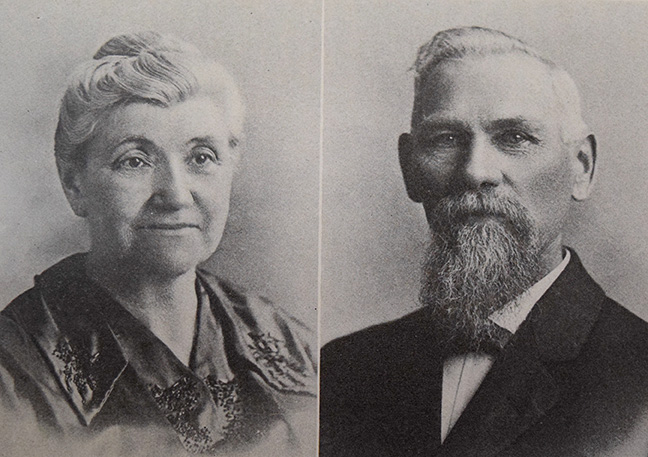It was likely the only mail received in Eitzen, Minn., from the King and Queen of England. Surely, it was appreciated by Edmund Freiberg (pronounced with a long “I” sound, fry -berg), however it was a condolence card that came with the death certificate for his son. It arrived in 1943, the year following Ralph Freiberg being declared missing after his combat plane did not return from a May 4, 1942, mission during World War II.
Ralph, a 31-year-old Eitzen native and Caledonia High School graduate, was serving with the Royal Air Force (RAF) in England when his plane crashed into the English Channel. When he volunteered in 1941, the United States had not yet entered the war. By the time he died in 1942, the U. S. had entered the conflict, and Freiberg was expected to transfer from the British forces to the American forces. But before that transfer took place, his military service and his life abruptly ended. His body was never recovered.
Ralph graduated from Caledonia High School in 1929 and then studied at the University of Minnesota. His love for flying would soon take him to faraway places and association with pilots who were responding to the immediate need for pilots during a world war. Freiberg began flying with the U.S. Naval Reserve. He lived in Texas before for going for advanced flight training in California, where he met Canadian pilots who were training to fly in England, which was experiencing a bombing “blitz” by Nazi Germany. In October 1941, he went for additional training in Canada where enlisted and was sent to England for commission in the RAF.
Freiberg was one of many Americans who volunteered to serve in the war before the United States was drawn into the conflict. He was a member of Eagle Squadron 121, one of three Eagle squadrons manned by American volunteers who had joined the RAF.
On December 2, 1941, Ralph wrote a letter from his base in London to his high school friend Ray Ryan, who was the publisher of the Caledonia Argus, which published the letter in late January, 1942:
“Well, I imagine by the time you get this you will have had your fill of Christmas turkey which I wish I will have had. I certainly envy you. Our trip across was quite uneventful, although the sea was pretty rough and we didn’t average over 6 knots per hour – being in a slow convoy of about 50 ships – so it took us over 15 days.
“A complete blackout on all the ships, all night, sort of prepared us for the blackout over here in which it is pretty difficult to navigate. All public places close about 9:30 and buses quit running at 10 so there is not much danger of lack of sleep.
“Certain foods are plentiful but quite different from what we are accustomed and naturally the luxuries such as oranges, sugar and butter, etc. are well nigh unobtainable.
“I am now at an operational training unit in northeastern England – flying Hurricanes which are pretty nice – about 1050 H.P and well over 300 mph. Will be here until the middle of January after which I understand we will go to Eagle Squadron. As yet I have heard or seen no enemy action but only because I haven’t been at the right place at the right time. The first night I arrived we were greeted by air raid sirens, but no bombs were dropped.
“There are about 20 fellows over here that I knew in the States – but of course, they are stationed all over the country and I don’t get to see them much.
“The weather has been lousy – so we haven’t been able to do much flying – but we have been flying in weather that which would have grounded everything in the States – good practice providing you are perfect in your practice. Of course, I guess that is why Sherman was correct in his opinion about war. The country is quite nice – although everything is done on so much smaller a scale than over there and that is a little bit difficult to get used to at first. Every square foot of ground is used to advantage and the farms look like a group of gardens surrounded by hedges. Ireland, I think is the prettiest country – looks almost like a picture. (I know that should please your ego.) Most of the cities here still indicate the terrific beating they took last year during the Blitz, although repairs are being made to some extent. Well, Ray, I’ll drop you a line next month and if you have time write to me. Say hello to all my friends.” The letter was signed, “Ralph.”
Ralph’s name appears on the Veterans Memorial at the Houston County Courthouse. He is the only World War II name on the Gold Star Honor Roll at St. Luke’s Church in Eitzen, commemorating those from the church who died in combat.
Near the U. S. Embassy in London, England, Freiberg is included on the Eagle Squadron Memorial, dedicated to 244 American and 16 British pilots and other personnel. His name also appears in the Roll of Honour at the American Memorial Chapel at St. Paul’s Cathedral and at the Air Force Memorial at Runnymeade, 20 miles southwest of central London on the River Thames.
Freiberg was one of many Americans with German ancestry who fought against Nazi Germany. Ralph’s grandfather William Freiberg (born 1849) emigrated from Germany as a teenager in 1865 and worked for two or three years at his brother’s blacksmith shop in Brownsville. After working in Winona, Trempeleau, Wis., and Chicago, he returned to Brownsville. In 1874, William opened his own blacksmith shop and later a farm implement business in Eitzen, where he married Mary Bunge.
The first child of William and Mary was Edmund H. Freiberg, who with his wife Malinda Deters Freiberg became the parents of two children, Viola and Ralph, the latter born April 25, 1911.
Source: Research and 2012 newspaper writing of Angela Murphy




Leave a Reply